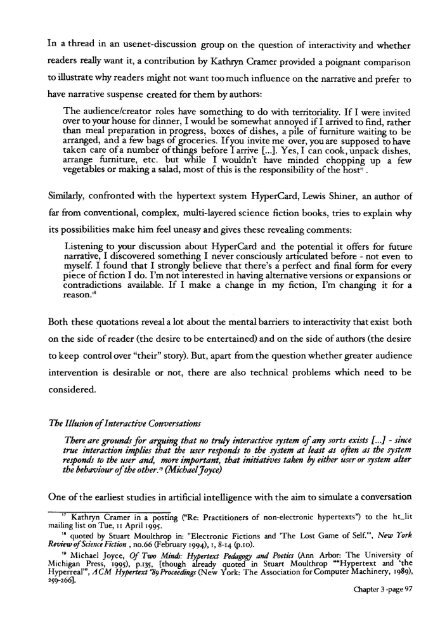From Page to Screen - WRAP: Warwick Research Archive Portal ...
From Page to Screen - WRAP: Warwick Research Archive Portal ...
From Page to Screen - WRAP: Warwick Research Archive Portal ...
Create successful ePaper yourself
Turn your PDF publications into a flip-book with our unique Google optimized e-Paper software.
In a thread in an usenet-discussion group on the question of interactivity and whether<br />
readers really want it, a contribution by Kathryn Cramer provided a poignant comparison<br />
<strong>to</strong> illustrate why readers might not want <strong>to</strong>o much influence on the narrative and prefer <strong>to</strong><br />
have narrative suspense created for them by authors:<br />
The audience/crea<strong>to</strong>r roles have something <strong>to</strong> do with terri<strong>to</strong>riality. If I were invited<br />
over <strong>to</strong> your house for dinner, I would be somewhat annoyed ifI arrived <strong>to</strong> find, rather<br />
than meal preparation in progress, boxes of dishes, a pile of furniture waiting <strong>to</strong> be<br />
arranged, and a few bags of groceries. Ifyou invite me over, you are supposed <strong>to</strong> have<br />
taken care ofa number ofthings before I arrive {...}. Yes, I can cook, unpack dishes,<br />
arrange furniture, etc. but while I wouldn't have minded chopping up a few<br />
vegetables or making a salad, most ofthis is the responsibility ofthe host" .<br />
Similarly, confronted with the hypertext system HyperCard, Lewis Shiner, an author of<br />
far from conventional, complex, multi-layered science fiction books, tries <strong>to</strong> explain why<br />
its possibilities make him feel uneasy and gives these revealing comments:<br />
Listening <strong>to</strong> your discussion about HyperCard and the potential it offers for future<br />
narrative, I discovered something I never consciously articulated before - not even <strong>to</strong><br />
myself. I found that I strongly believe that there's a perfect and final form for every<br />
piece offiction I do. I'm not interested in having alternative versions or expansions or<br />
contradictions available. If I make a change in my fiction, I'm changing it for a<br />
reason."<br />
Both these quotations reveal a lot about the mental barriers <strong>to</strong> interactivity that exist both<br />
on the side ofreader (the desire <strong>to</strong> be entertained) and on the side ofauthors (the desire<br />
<strong>to</strong> keep controlover "their" s<strong>to</strong>ry). But, apart from the question whether greater audience<br />
intervention is desirable or not, there are also technical problems which need <strong>to</strong> be<br />
considered.<br />
The Illusion ofInteractive Conversations<br />
There are grounds for arguing that no truly interactive system ofany sorts exists {'..J - since<br />
true interaction implies that the user responds <strong>to</strong> the system at least as often as the system<br />
responds <strong>to</strong> the user and, more important, that initiatives taken by either user orsystem alter<br />
thebehaviour oftheother. I9 (MichaelJoyce)<br />
One ofthe earliest studies in artificial intelligence with the aim <strong>to</strong> simulate a conversation<br />
17 Kathryn Cramer in a posting ("Re: Practitioners of non-electronic hypertexts") <strong>to</strong> the hr.Iit<br />
mailing list on Tue, II April 1995.<br />
18 quoted by Stuart Moulthrop in: "Electronic Fictions and 'The Lost Game of Self.III, New York<br />
ReoieurofScience Fiction, no.66 (February 1994), 1,8-14 (P.IO).<br />
19 Michael Joyce, Of Two Minds: Hypertext Pedagogy and Poetics (Ann Arbor: The University of<br />
Michigan Press, 1995), P.I35, [though already quoted in Stuart Moulthrop ""Hypertext and 'the<br />
Hyperreal''', ACM Hypertext "89Proceedings (New York: The Association for Computer Machinery, 1989),<br />
259-266}.<br />
Chapter 3 -page 97





